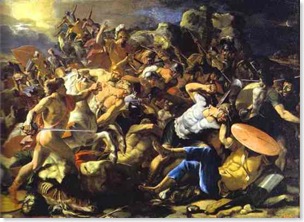Reflecting on a Christmas day discussion about the state of Christian-backed Israel, and the ongoing madness in the middle-East, and our justifications of war and violence…I’m left wondering how this baby Jesus, that we celebrate as prince of peace, grew up to be like his Deuteronomy dad.
 I mean, is the great upshot of the gospel story about adding a phlegmatic personality to a choleric OT God? Or is it about revolutionizing our notion of God?
I mean, is the great upshot of the gospel story about adding a phlegmatic personality to a choleric OT God? Or is it about revolutionizing our notion of God?
That is, if Jesus is the full expression of God, how can we can continue to link violence, sacrificial or otherwise, to God? How can we can keep on canonizing our ways of violence–exclusion and scapegoating–by appealing to something like God’s wrath? Doesn’t the Jesus story show that the only wrath around, is ours, not God’s?
What I see is that the fits-and-starts, nevertheless progressive revelation (story) in the Old Testament, is from God-backed wars and God-ordained genocide and ethnic cleansing, to late prophetic utterances, like Isaiah’s: that God, in faithfully bringing forth justice, "will not break a bruised reed, or quench a dimly burning wick."
So when our western hemisphere leaders and pastors stand behind pulpits in Christian churches and pray for God’s victorious help in war, we may be following a literal formula in Deuteronomy, but we aren’t imitating Jesus.
Jesus is the non-violent God who has come to undo our own violence. The way I see it, that’s the good-difficult news of Christmas.

There is a godly wrath, methinks, and it’s reflected in the Jesus story. And it’s related to injustice.
However, I think we’re called to pray for peace/shalom rather than victory.
And I’m on very slipper ground when I mistake my wrath for God’s!
Couldn’t it be that there is plain old wrath that comes to us and is unavoidable, whether justifiable or not, yet it is more of an issue of what we choose to do with the wrath?… Ghandi made a different choice than most leaders but he was still angry at what was happening – the injustices.
“I mean, is the great upshot of the gospel story about adding a phlegmatic personality to a choleric OT God? Or is it about revolutionizing our notion of God?”
from one melancholic to another
that is a great quote about the personality types of God